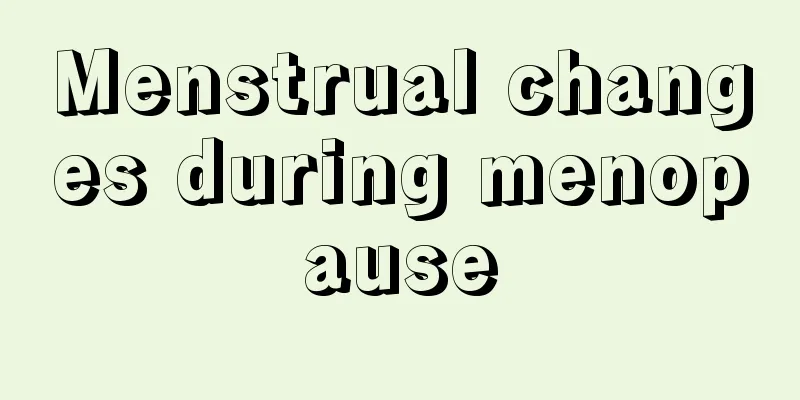Menstrual changes during menopause

|
When women reach the age of 40, their ovaries begin to decline. Ovarian decline is mainly reflected in the menstrual cycle. At this time, women may experience symptoms such as decreased menstrual volume and delayed menstruation, which are actually very normal. When a woman enters menopause, her periods stop. The decline of the ovaries will inevitably lead to the secretion of estrogen, thereby inducing other symptoms. Menopause is a special stage that every woman must go through. Its symptoms are varied and complex. The main ones are irregular menstruation, sometimes more and sometimes less; sometimes menstruation is continuous, from one month to the next; sometimes there is sudden menstruation and diarrhea, heavy bleeding, etc. Menopausal irregular menstruation is a common phenomenon and is very harmful. Women's reproductive tract inflammation and reproductive tract tumors, such as endometritis, uterine fibroids, uterine body cancer, cervical polyps, cervical cancer, ovarian tumors, etc., as well as some systemic diseases, such as blood diseases, hypertension, abnormal thyroid function, etc., can cause irregular vaginal bleeding, which can easily be confused with menopausal menstrual disorders. Therefore, be alert to menopausal menstrual disorders. When it comes to the treatment of menopausal irregular menstruation, the first thing to consider is whether the irregular menstruation is caused by a disease. After finding the cause, the cause of the irregular menstruation should be treated first. Because of the particularity of menopausal irregular menstruation (it is very likely caused by a disease), the treatment of menopausal irregular menstruation must be careful and cautious, find the cause and then treat it symptomatically or adjust the body. Traditional Chinese medicine can be used for conditioning. Chinese herbal medicine is more professional in regulating the human body. In life, you can often eat foods rich in phytoestrogens and vitamin E, which has a very good effect on ovarian maintenance. Making soy milk with soybeans, red beans, and black beans and drinking it every day is a very safe way to supplement phytoestrogens, but it requires long-term persistence to be effective. And you must not eat spicy, greasy, fried, pickled foods, and you must also avoid smoking and drinking. Irregular menstruation during menopause can lead to iron deficiency anemia. Eating more iron-containing foods and supplementing with sufficient iron can avoid the occurrence of iron deficiency anemia. Foods such as kelp, seaweed, soybeans, spinach, jujube, fungus, and shiitake mushrooms are rich in iron, especially animal liver, animal whole blood, livestock and poultry meat, fish, and other foods, which are richer in iron. |
>>: Delayed menstruation during menopause
Recommend
Can I take a bath after one month of confinement?
After ten months of hardship, the baby was finall...
Sleep for immunity
This is the 3047th article of Da Yi Xiao Hu This ...
Are prenatal dreams accurate?
Many people believe that dreams have certain mean...
Eating "cold rice" regularly can lower blood lipids, blood sugar, and even improve fatty liver?
Rice is an indispensable staple food on the table...
Leucorrhea self-examination chart
Under normal circumstances, there is often a smal...
What should I do if candidal vaginitis is transmitted to men?
When a woman gets candidal vaginitis, she must pa...
Why can't Tremella be cooked? How to cook Tremella so that it can be cooked easily
As we all know, Tremella is a common delicacy. It...
What is the reason for yellowish and bloody vaginal discharge?
Many gynecological diseases can be manifested thr...
When will Lake Baikal freeze? What to wear when visiting Lake Baikal
Lake Baikal is a popular tourist attraction in Ru...
What should women with breast hyperplasia pay attention to?
Nowadays, there are many women suffering from bre...
Can an anesthesia analgesia pump solve the problem of postoperative pain? Who is suitable for installing an analgesia pump?
With the progress of modern medicine, not only th...
What should I eat more if I have Qi and blood deficiency?
The condition of insufficient blood and qi is mor...
Symptoms of uterine fibroids compressing the rectum
Although the medical community has not yet been a...
Reasons why women always feel the urge to urinate
Many female friends always feel the urge to urina...









